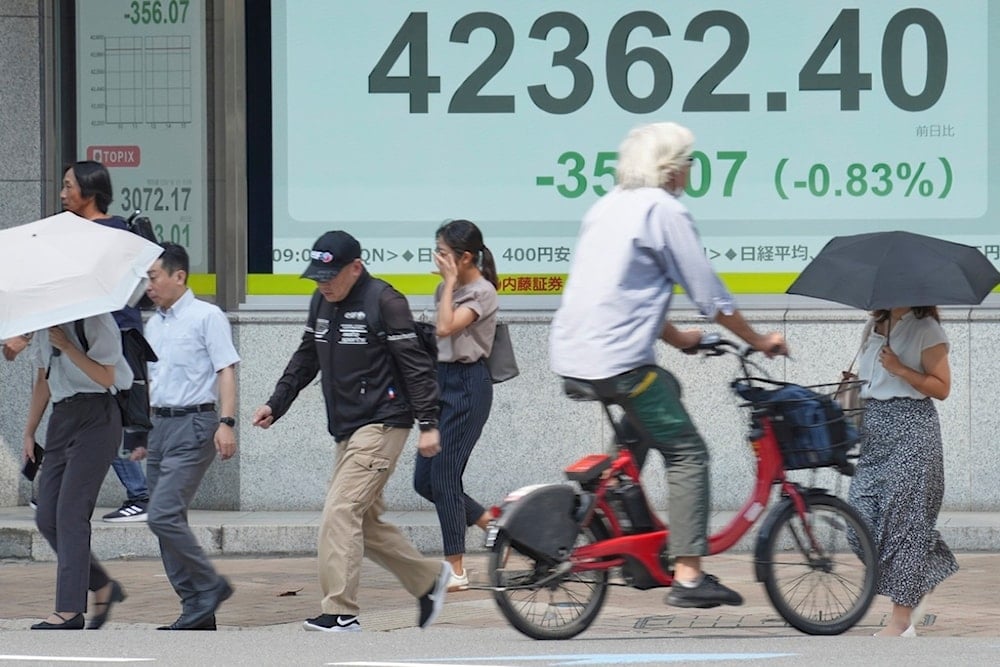Tokyo caught between US uncertainty, China’s rise: Japan Times
Japan faces its toughest strategic test since WWII, Japan Times reports, balancing US security doubts with China’s growing economic and regional power.
-

People walk in front of an electronic stock board showing Japan's Nikkei index at a securities firm Monday, September 1, 2025, in Tokyo. (AP)
Japan is confronting its starkest strategic challenge in decades as it struggles to balance reliance on a less dependable United States with growing dependence on an assertive China, The Japan Times reported Thursday.
According to the paper, the US-led order that underpinned Japan’s postwar prosperity is gone, but a new system has yet to take shape. This “interregnum,” a concept borrowed from Italian Marxist philosopher Antonio Gramsci, leaves Tokyo navigating between a weary security patron in Washington and a dominant economic partner in Beijing.
The Japan Times described Japan’s predicament as a prisoner’s dilemma. If Tokyo deepens ties with Washington while US commitments to Asia fade, it risks isolation. If it leans toward Beijing, it risks subordination. Maintaining strong ties with both is increasingly untenable as the US-China rivalry escalates.
Recent developments have sharpened these tensions. Trump’s second administration has unsettled allies with tariffs, featured public scoldings of leaders, and even laid out a red-carpet welcome for Russian President Vladimir Putin. Moreover, Trump’s repeated demands that Japan pay more for US bases further eroded confidence in the alliance, The Japan Times noted.
Limited models to follow
The paper explored several models Japan might look to, but found each inadequate. Southeast Asian “hedging” strategies, maintaining US security links while deepening economic ties with China, are not feasible for a country of Japan’s size and visibility. Hungary’s “connectivity,” balancing Western institutional ties with partnerships with China and Russia, depends on EU and NATO security guarantees Japan does not enjoy.
Japan’s options are constrained by demographic decline, geographic vulnerability, and high costs of decoupling from China. Yet The Japan Times emphasized that Tokyo retains critical advantages: a top-10 global economy, technological strength, democratic credibility, and networks of development assistance and soft power. Institutions such as the CPTPP allow Japan to help shape new trade and governance rules, rather than accept frameworks imposed by others.
Rather than choosing between Washington and Beijing, The Japan Times argued, Tokyo must build a portfolio of partnerships. This includes defense cooperation with Australia, India, the United Kingdom, and France, and economic engagement with Southeast Asia and Europe. Japan should form different coalitions for different issues, working with certain nations on technology standards, with maritime nations on freedom of navigation, and with China on climate change.
Shaping the future order
The paper stressed that resilience must trump efficiency, stressing that Japan should develop redundant supply chains, strategic reserves, and domestic production in critical sectors, even at higher cost, as insurance against coercion.
According to The Japan Times, Japan should resist pressure to choose sides in an interregnum. Like Taiwan’s strategic ambiguity, Tokyo’s studied vagueness could buy time while it builds capabilities for multiple futures. However, the long-term aim is not neutrality, but rather acquiring agency, including ensuring that neither the US nor China dictates Japan’s future.
“The alternative,” the paper concluded, “is gambling on either US reliability or Chinese benevolence, a strategy that amounts to no strategy at all.” Instead, Tokyo must craft its own game to preserve prosperity and security in a turbulent era.

 3 Min Read
3 Min Read










